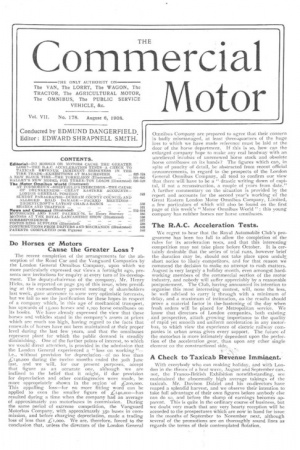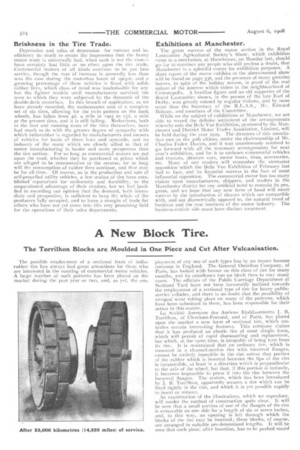Do Horses or Motors Cause the Greater Loss ?
Page 1

Page 2

If you've noticed an error in this article please click here to report it so we can fix it.
The recent completion of the arrangements for the absorption of the ROad Car and the Vanguard Companies by the London General Omnibus Company, upon which we more particularly expressed our views a fortnight ago, presents new invitations for enquiry at.every turn of its development. The deputy-chairman of the company, Mr. Henry Flicks, as is reported on page 529 of this issue, when presiding at the extraordinary general meeting of shareholders last week, gave utterance to some very optimistic forecasts, but we fail to see the justification for these hopes in respect of a company which, in this age of mechanical transport, has upwards of 15,eao horses and 1,200 horse omnibuses on its books. We have already expressed the view that these horses and vehicles stand in the company's assets at prices which are much too high, having regard to the facts that renewals of horses have not been maintained at their proper level during the last few years, and that the omnibuses represent plant for which the public demand is steadily diminishing. One of the further points of interest, to which we would direct attention, is provided in the admission that the London General experienced a " loss on working "i.e., without provision for depreciation—of no less than ,..;140,000 during the twelve months ended the 3oth June last, and we will, for our present purposes, accept that figure as an accurate one, although we are inclined to the belief that it might, if due provision for depreeintion and other contingencies were made, be more appropriately shown in the region • of .200,000. This appalling loss—for no more fitting word can be applied to even the smaller figure of ..I40,000—has resulted during a time when the company had an average of approximately 210 motorbuses in commission. During the same period of extreme competition, the Vanguard Motorbus Company, with approximately 35o buses in commission, and before charging depreciation, made a trading loss of less than .L'i,000. We are, therefore, forced to the conclusion that, unless the directors of the London General
Omnibus Company are prepared to agree that their concern is badly mismanaged, at least three-quarters of the huge loss to which we have made reference must be laid at the door of the horse department. If this is so, how can the enlarged company hope to make any real headway with an unrelieved incubus of unrenewed horse stock and obsolete horse omnibuses on its hands? The figures which can, in spite of paucity of detail, be abstracted from recent official announcements, in regard to the prospects of the London General Omnibus Company, all tend to confirm our view that there will have to be a " drastic writing down of capital, if not a reconstruction, a couple of years from date." A further commentary on the situation is provided by the report and accounts for the second year's working of the Great Eastern London Motor Omnibus Company, Limited, a few particulars of Which will also be found on the first page of this week's " Motor Omnibus World " : this young company has neither horses nor horse cmnibuses.
The R.A.C. Acceleration Tests.
We regret to hear that the Royal Automobile Club's programme has been too full to allow the completion of the rules for its acceleration tests, and that thiS interesting competition may not take place before October. It is certainly desirable that the series of trial runs, however brief the duration may be, should not take place upon unduly, short notice to likely competitors, and for that reason we commend the decision to make no attempt to rush matters. August is very largely a holiday month, even amongst hardworking members of the commercial section of the motor industry, and nobody will suffer appreciably by a reasonable postponement. The Club, having announced its intention to organise this most interesting contest, will, none the less, be well advised to carry it through with a minimum of delay, and a maximum of intimation, as the results should prove a material factor in the-hastening IA the day when fresh orders will be placed for Metropolitan service. We know that directors of London companies, both existing and prospective, attach growing importance to the quality of rapid yet smooth and uniform acceleration in any motorbus, to which view the experience of electric railway companies in urban areas gives every support. The future of the motorbus is more intimately dependent upon the perfection of the acceleration gear, than upon any other single element on the constructional side_
A Check to Taxicab Revenue Imininent.
With everybody who can making holiday, and with London in the threes of a heat wave, August and September cannot, the Franco-British Exhibition notwithstanding, see maintained the abnormally high average takings of the taxicab. Mr. Davison Dalziel and his co-directors have reaped a splendid harvest, and we observe their intention to take full advantage of their own figures before anybody else can do so, and before the slump of earnings becomes apparent. This is quite in the ordinary course of business, but we doubt very much thatany very hearty reception will he accorded to the prospectuses which are now in hand-for issue in the months of September to November next, although several of the promotions arc on thoroughly sound lines as regards the terms of their contemplated flotation,
Briskness in the Tire Trade.
Depression and talks of depressionfor rumour and inefficiency do much to create the impression that the heavy motor trade is universally bad, when such is not the case— have certainly had little or no effect upon the tire trade. Commercial motors of all kinds continue to be put into service, though the rate Of increase is avowedly less than was the case during the motorbus boom of 1905-6, and a growing percentage of these vehicles is fitted with solidrubber tires, which class of tread was inadmissible for any but the lighter models until manufacturers survived the tests to which they were subjected by the demands of the double-deck motorbus. In this branch of application, as we have already recorded, the maintenance cost of a complete set of six tires, allowing for the twin pattern on the back wheels, has fallen from 4d. a mile in 1903 to OA a mile at the present time, and it is still falling. Reductions, both in the first and running costs of the tires themselves, have had much to do with the greater degree of sympathy with which indiarubber is regarded by manufacturers and owners of vehicles for loads of three tons and upwards, and no industry of the many which are closely allied to that of motor manufacturing is busier and more prosperous than the tire section. For so long as commercial motors are put upon the road, whether they be purchased at prices which are alleged to be remunerative or the reverse, for so long will the consumption of rubber tires continue, and that may be for all time. • Of course, as in the production and sale of self-propelled utility vehicles, a few makes of tire have established reputations for uniformity and durability, to the unquestioned advantage of their vendors, but we feel justified in recording our opinion that the demand, bOth 1111O1Cdiate and prospective, is sufficient to keep the whole of the producers fully occupied, and to leave a margin of trade for others who have not yet come into this very promising field for the operations of their sales departments.
Exhibitions at Manchester.
The great success of the motor section in the Royal Lancashire Agricultural Society's Show, which exhibition came to a conclusion, at Manchester, on Monday last, should go far to convince any people who still profess a doubt, that Manchester is a splendid centre for exhibition purposes. A short report of the motor exhibits at the above-named show will be found on page 536, and the presence of many genuine buyers, in spite of the holiday season, is proof of the real nature of the interest which exists in the neighbourhood of Cottonopolis. A familiar figure and an old supporter of the Royal Lancashire shows, in the person of the late Earl of Derby, was greatly missed by regular visitors, and by none more than the Secretary of the R.L.A.S., Mr. Edward Bohane, and members of the Committee.
While on the subject of exhibitions at Manchester, we are able to record the definite settlement of the arrangements w hereby only the Belle Vue Exhibition, promoted by the Manchester and District Motor Trades Association, Limited, will be held during the year tgon. The directors of this association met on the 30111 ultimo, under the chairmanship of Mr. Charles Eaten Davies, and it was unanimously resolved to go forward with all the necessary arrangements for next year's exhibition, and for it to embrace commercial vehicles and tractors, pleasure cars, motor boats, tires, accessories, etc. Many of our readers will remember the strenuous opposition which the Belle Vue Exhibition of February last had to face, and its financial success in the face of most influential opposition. The commercial motor has too many claims upon manufacturers, shippers, and traders in the Manchester district for any artificial bond to restrain its pro_ gress, and we hope that any new form of bond will merit success by the introduction of clauses which are compatible with, and not diametrically opposed to, the natural trend of business and the true interests of the motor industry. The business-vehicle side must have distinct treatment.


















